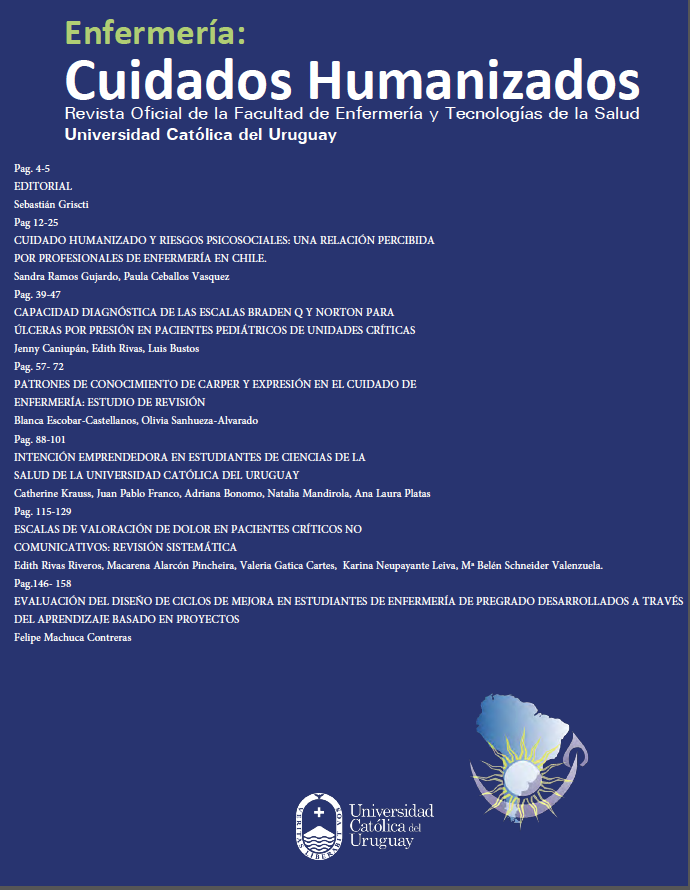PHILOSOPHICAL VIEW OF HUMAN CARE IN THE WOMAN IN THE CLIMACTERIC STAGE
DOI:
https://doi.org/10.22235/ech.v8i1.1795Abstract
Middle-aged women, although they may have concluded with the biological reproductive cycle, maintain an important social role that is expressed through their active participation in community life, without abandoning the responsibilities assumed in the home and family, which it contributes to the exacerbation of climacteric symptoms in intensity and frequency, in correspondence with social determinants because of their sex. On the other hand, the living conditions of women have undergone significant changes in the last decades: the progressive increase of opportunities for labor insertion, birth control, reduction of fertility, improvement in the effectiveness of preventive measures, increase in life expectancy, reduction of gender barriers, changes in social roles, all of which must be considered in their health care. Therefore it is necessary to focus the care from a philosophical perceptive that allows us to perform it in an integral way, without setting aside emotional, spiritual and psychosocial aspects. The primary care service is essential to provide a source of care that has continuity, coordination, and that covers in a global way the health needs of people. Whatever the type of transition, it implies from the nursing staff the need to know the beliefs and practices in each one of the transitional situations of the person in order to offer a culturally congruent care. This implies knowing how humans adapt to the transition, and how the environment affects that adaptation. This importance derives from the fact that nursing seeks to maximize the strengths and potentials of people
Downloads
References
2. Lugones M, Navarro D. Síndrome climatérico y algunos factores socioculturales relacionados con esta etapa. Rev. Cubana Obst. Gine. 2006; 32(1):123-5.
3. González A, Vea B, Visbal A. Construcción de un instrumento para medir la satisfacción personal en mujeres de mediana edad. Rev. Cubana Salud Pública (Cuba) 2004; 30(2).
4. Navarro D. Síndrome Climatérico: Su repercusión social en mujeres de edad Mediana. Revista Cubana. Obstetricia y Ginecología. 2002; 27(21): 22-7.
5. Zanotelli SS, Ressel LB, Borges ZN, Junges CF, Sanfelice C. Vivências de mulheres acerca do climatério em uma unidade de saúde da família. Rev pesqui cuid fundam [En línea]. Disponible en: http://www.seer.unirio.br/index.php/cuidadofundamental/article/view/1632/pdf_492
6. Beltramini ACS, Diez CAP, Camargo IO, Preto VA. Atuação do enfermeiro diante da importância da assistência à saúde da mulher no climatério. REME rev min enferm [Internet]. 2010 [acceso en: 12 jan 2014];14(2):166-74. Disponibleem: http://www.enf.ufmg.br/site_novo/modules/mastop_publish/files/files_4cbd7dcfe085a.pdf
7. Meleis A. Enfermería Teórica: Desarrollo y Progreso. Filadelfia: Lippincott; 1997.
8. Chick N, Meleis A. Transiciones: Una preocupación de enfermería. En: Chinn PL, editor. Metodología de investigación en enfermería. Boulder, Co: Aspen; 1986.
9. Leininger M. Diversidad y universalidad del cuidado de la cultura: una teoría de la enfermería. Nueva York: Liga Nacional de Prensa de Enfermería; 1991.
10. Leininger M. Enfermería transcultural: conceptos, teorías y prácticas. Nueva York: John Wiley and Sons; 1978.
11. Rivas E, Navarro D, Tuero AD. Factores relacionados con la demanda de atención médica durante el climaterio. Rev Cubana Endocrinol 2006; 17(2). [En línea]. Disponible en: http://scielo.sld.cu/scielo.php?script=sci_pdf&pid=S1561-29532006000200004&lng=es&nrm=iso&tlng=es
12. Lugones M, Ramírez, M. Lo social y lo cultural. Su importancia en la mujer de edad mediana. Rev Cubana Obstet Ginecol 2008; 34 (1).
13. Boff L. El cuidado esencial. Ética de lo humano, compasión por la tierra. Madrid: Trotta; 2002.
14. Boff L. Saber cuidar. Ética do humano-compaixão pela terra. Petrópolis: Vozes; 1999.
15. Rivera MS, Herrera LM. Fundamentos fenomenológicos para un cuidado comprensivo de enfermería. Texto contexto-enferm. 2006; 15:158-163. [En línea] URL disponible en: http://www.scielo.br/scielo.php?pid=S0104-07072006000500019&script=sci_arttext
16. Heidegger M. El ser y el tiempo. Madrid: Trotta; 2003.
17. Peña B. El ethos del cuidado de la vida. Bogotá: Universidad Nacional de Colombia; 2007.
18. Inwood M. Dicionário Heidegger. Río de Janeiro: Jorge Zahar Editor; 2002. p. 26-27.
19. Medina B. Cuidado de sí, una visión ontológica. Fermentario 2009; 3. [En línea] Disponible en: http://www.fermentario.fhuce.edu.uy/index.php/fermentario/article/view/18
20. Salmerón F. Lenguaje y significado en "El Ser y el Tiempo" de Heidegger. Diànoia 1968; 14(14):103. [En línea] Disponible en: http://dianoia.filosoficas.unam.mx/info/1968/DIA68_Salmeron.pdf
21. Foucault M. El cuidado de sí. La inversión del platonismo desde la mirada de Michel Foucault. La recensión foucaultiana del pensamiento clásico. Santiago de Chile: Instituto de Humanidades de la Universidad Diego Portales; 2007.
22. Foucault M. La ética del cuidado de uno mismo como práctica de la libertad. Concordia 1984; 6:99-116. (Entrevista realizada por Raúl Fomet-Betancourt, Helmul Becker y Alfredo Gómez-Muller el 20 de enero de 1984). [En línea] Disponible en: http://catedras.fsoc.uba.ar/heler/foucaltetica.htm
23. Backes DS, Macedo de Sousa FG, Schaeffer AL, Lorenzini A, Nascimento KC, Lessmann JC. Concepções de cuidado: uma análise das teses apresentadas para um programa de pós-graduação em enfermagem. Texto contexto-enferm. 2006; (15):71-76.
24. Silva AL. La Dimensión Humana del Cuidado en Enfermería. Acta Paul Enf. 2000; (13).
25. Pereira AL, Rivera SD. O cuidado de si como principio ético do trabalho em enfermagem. Texto contexto-enferm. 2005; (14):111-119.
26. Muñoz NE. Reflexiones sobre el cuidado de sí como categoría de análisis en salud. Salud Colectiva. 2009; 5(3):391-401. [En línea]. Disponible en: http://www.scielo.org.ar/scielo.php?script=sci_arttext&pid=S1851-82652009000300007&lng=es
27. Guevara B, Zambrano de Guerrero A, Evies, A. Cosmovisión en el cuidar de sí y cuidar de otro. Enferm Global 2011; 10(21). [En línea]. Disponible en: http://scielo.isciii.es/scielo.php?script=sci_arttext&pid=S169561412011000100021&lng=es
Downloads
Published
How to Cite
Issue
Section
License
Copyright (c) 2019 Enfermería: Cuidados Humanizados

This work is licensed under a Creative Commons Attribution 4.0 International License.

















